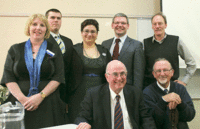Palmerston North
Paul Green
9 November 2011
New Zealand tops the list of OECD countries in terms of income inequality, according to Caritas research. Research and Advocacy coordinator Lisa Beech showed a political forum in Palmerston North which the local Justice, Peace and Development Commission organised for Social Justice Week in September how far the country is from giving Kiwis a fair go.
In a moving presentation on September 10, Lisa advocated for the most disadvantaged and recounted her own experiences as a solo parent and beneficiary.
Representatives of five political parties, currently in Parliament, accepted our invitation to speak to the issues as they saw them in a forum at the Palmerston North Diocesan Centre. The title was ‘A Level Playing Field: In Pursuit of Equality’.
Bringing children out of poverty
Greens co-leader Metiria Turei outlined her party’s plans for bringing thousands of New Zealand children out from under the poverty line.
 The Working for Families childcare subsidy needed to be extended to beneficiaries, the minimum wage needed to be raised, the Training Incentive Allowance needed to cover tertiary study and minimum energy efficiency standards needed to be applied to rental housing.
The Working for Families childcare subsidy needed to be extended to beneficiaries, the minimum wage needed to be raised, the Training Incentive Allowance needed to cover tertiary study and minimum energy efficiency standards needed to be applied to rental housing.
She criticised the National-led government’s emphasis on economic growth as an ideologically driven set of programmes that served to make the few wealthier. Her presentation was also grounded in her experiences as a beneficiary.
Labour’s Iain Lees-Galloway said children had to be at the centre of the government’s investments because they are vital to the nation’s future. He introduced a recent UK book The Spirit Level written by a health researcher Richard Wilkinson and journalist, Kate Pickett, which shows that the nations with the greatest equality are those with the best health and well-being on all social indicators.
The authors show that developed societies that continue to focus on economic growth have more crime, obesity and illness with less happiness and satisfaction to go with the increase in their inequality.
As the National Party’s local candidate, Leonie Hapeta made extensive reference to National’s achievements since taking control of the government three years ago. She also referred to her experiences of hard times but emphasised that, for her, a level playing field translated into equality of opportunity. Leonie was equally passionate about getting people off the welfare and into work as the best way to make brighter futures for families.
Daniel Stratton gave a simple presentation of the Act Party’s economic philosophy, but agreed with much of what he read in the Caritas brochure on social justice and a fair go for Kiwis. He shared the concern of others about investing in mental health, but emphasised that equalising incomes was simply another way of decreasing freedoms. Taxing the rich to give to the poor may sound good, but it creates more problems in the long term.
Seasoned campaigner for social justice John Minto, representing the Mana Party, blamed the high level of inequality on the reforms of the 1980s under Labour and 1990s under National. The privatisation of public assets and the continuing push for free trade agreements would do nothing for equality and would lead to an even greater loss of national sovereignty. He said GST as a tax on the poor should be abolished and the minimum wage tied to two-thirds of the average wage.
In the ensuing discussion serious questions were raised about the impact of the proposed Trans-Pacific Partnership Agreement and its effect on the low cost of medicine via Pharmac, for example, given the right of foreign competitors to sue the government for supporting non-competitive practices. Issues like New Zealand’s high rate of imprisonment were raised and all parties agreed this had to be reduced. There was a robust discussion of the Alcohol bill that did not go far enough, and National Education standards, that were too focused on literacy and numeracy.
On the question of MMP most candidates were in favour of retaining it.
Retired Family Court judge Sir David Carruthers as chair, guided the presenters with insightful comments and humorous reflections that kept the meeting on an even keel.
A recording of the meeting is available from Rex Begley rbegley@pndiocese.org.nz or (06) 354 1780 ext 845.
Paul Green is chairperson of the Diocesan Commission for Justice Peace and Development.
Image: Leonie Hapeta National, Daniel Stratton Act, Metiria Turei Greens, Sir David Carruthers, Iain Lees-Galloway Labour, John Minto Mana and Rex Begley Diocesan Centre.